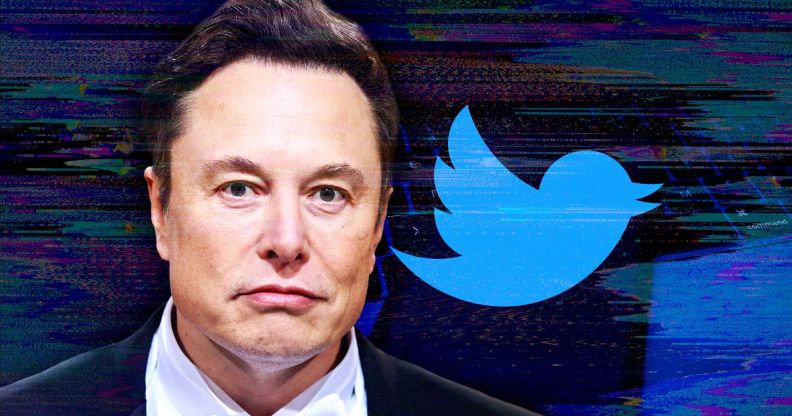Twitter claims hate speech is 30 per cent lower since Elon Musk acquisition. Experts disagree

Twitter has claimed that hate speech is 30 per cent lower since Elon Musk took over the platform. (Getty/ Twitter/ PinkNews)
Twitter has claimed that hate speech has dropped by 30 per cent since Elon Musk took over the platform, but expert researchers say otherwise.
A great deal of research has been conducted following Musk’s takeover of Twitter in 2023, with most noting a rise of hate speech on the platform.
Despite this, Twitter recently shared findings of an independent assessment, conducted by Sprinklr, on Tuesday (18 July). According to the software company’s s AI-powered model, the reach of hate speech on Twitter represents “an extremely small fraction of the overall conversation”.
Sprinklr research claims that from 1 January to 31 May 2023, the average daily number of English-language hate speech is 0.003 per cent compared with Twitter’s own, higher, estimate of 0.012 per cent.
“Additionally, we estimate hate speech impressions are 30 per cent lower on average vs. pre-acquisition,” Sprinklr stated.
‘We’ve not seen action from Twitter’
However, Joe Mulhall, the director of research at HOPE not hate, told PinkNews: “While Twitter is claiming to be cleaning up hate speech on their platform, this does not ring true to us or the minority groups affected.
“Despite reporting numerous examples of anti-LGBT+ slurs, we’ve not seen action from Twitter. This begs the question as to whether Twitter’s ‘success’ is down to moving the goal posts.”
This is supported by other organisations which monitor hate speech across social media platforms.
Media Matters research director, Kayla Gogarty, told PinkNews: “Twitter has gotten less safe for LGBTQ people under Musk’s leadership as he has abandoned much of the platform’s content moderation, pushed anti-trans rhetoric in his own tweets, and reinstated dozens of previously banned accounts, including ones that were banned for anti-LGBTQ hate.
“Regardless of what Musk has claimed, data studies from Media Matters and others have found that these actions have resulted in a rise in hate speech on the platform.
“And despite his contrary claims, Musk has just admitted that the company is still struggling to court back advertisers, who have pulled their ads from the platform out of concern for brand safety because their content may appear next to hateful content.”
Twitter’s statement has also been condemned by many users, including high profile names.
Twitter put the findings of the research down to its expansion of its Freedom of Speech, Not Reach policy enforcement in June.
The policy claims to promote and protect conversation, allowing users the right to their opinions without fear of censorship, but, where appropriate, restricting tweets that violate the platform’s policies in order to make the content less discoverable.
But Musk’s claims of users being able to express their opinions seems to stop when it comes to anything LGBTQ+ related.
In June, the billionaire declared that both “cis” and “cisgender” were slurs, warning people who engage in “repeated, targeted harassment” by using them on the platform face account suspensions.
The move came as Twitter was deemed to be the most dangerous platform for LGBTQ+ people, according to research by GLAAD.
Prior to this, in March, research by the Center for Countering Digital Hate found posts mentioning the anti-LGBTQ+ “groomer” narrative have soared by 119 per cent under Musk’s management.
Musk officially took over the site on 27 October, at a cost of $44 billion (£34 billion), and announced a “general amnesty” of banned accounts a month later as part of his “free speech” plan.
It’s been widely reported that Twitter has been in decline since the change of ownership, with anti-LGBTQ+ hate speech rocketing.
In July, a survey found that 60 per cent of LGBTQ+ social media users are turning their backs on mainstream platforms because of safety concerns, while a separate survey found 50 per cent of journalists have considered leaving Twitter.
Once seen as a place where LGBTQ+ people could organise, connect and call out injustices, Twitter is now seeing resistance to using the site expanding.
PinkNews has contacted Sprinklr comment.
How did this story make you feel?

